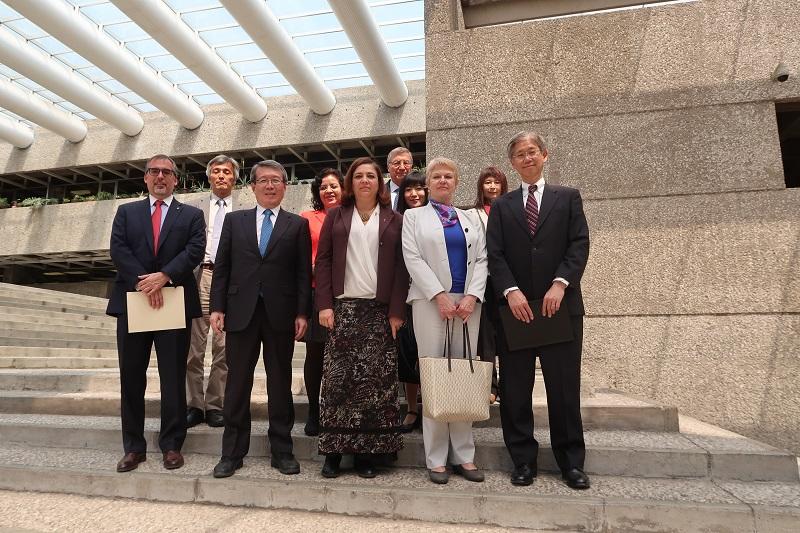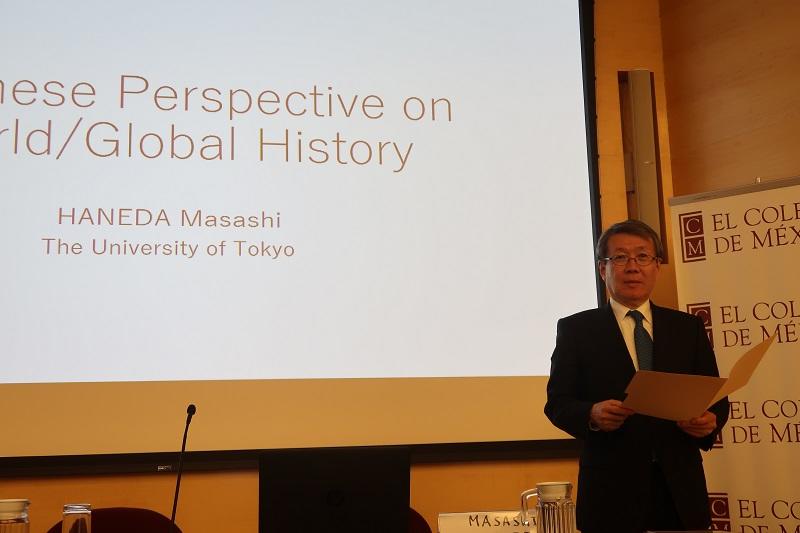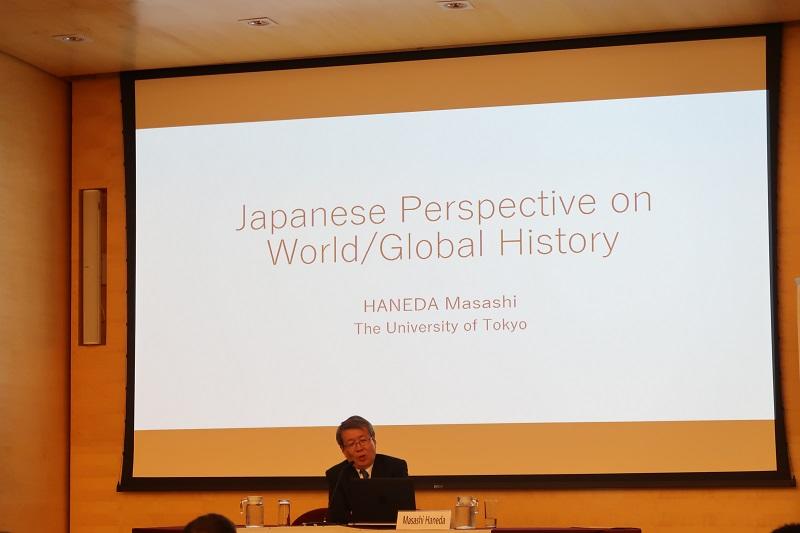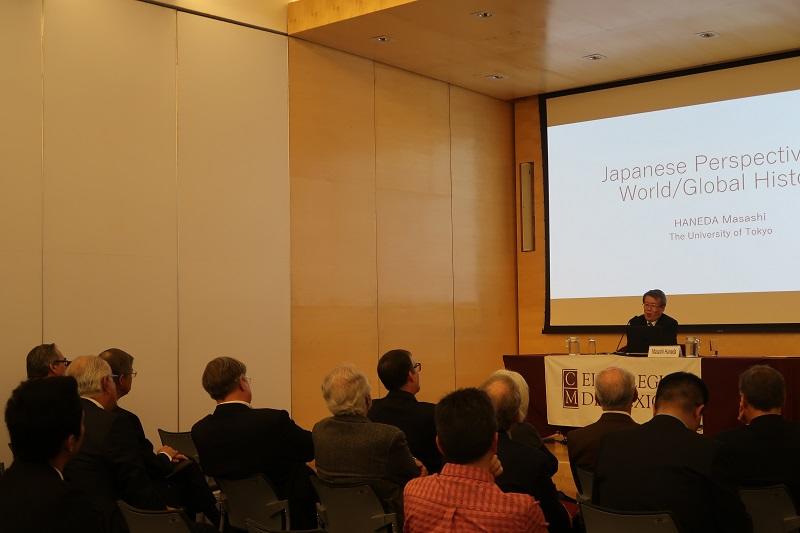2018.03.07
メキシコ出張報告 / Report on the visit to El Colegio de Mexico
2017年11月末に広島で開催された日墨学長会議の際、私はEl Colegio de Mexico(メキシコ大学院大学)のSilvia Giorguli学長、Amaury Garcia Rodriguezアジア・アフリカ研究センター長と懇談する機会を持った。お二人は私の研究内容に強い関心を示し、その場で、ぜひ近々にメキシコ大学院大学を訪問し、講演をするようにと慫慂された。メキシコ大学院大学は、ラテンアメリカで最高の研究レベルを誇る人文学・社会科学に特化した名門研究機関である。いわゆるGlobal North以外の場所に位置する研究機関や研究者との交流深化はGHCの重要な課題なので、私は喜んで彼らの招きを受け入れ、2018年2月26、27日の両日、メキシコシティの南部にあるメキシコ大学院大学を訪れた。 26日に開催された講演会では、Garcia所長が司会を務め、Giorguli学長と同大学の教員・学生の他に、近隣の他大学からの研究者や学生の参加もあった。また、高瀬駐メキシコ日本大使と大使館員や杉本国際交流基金メキシコ日本文化センター所長などメキシコシティの在留邦人の方々も何人かわざわざ出席して下さり、聴衆の数は数十人に達した。 “Japanese Perspectives on World/Global History”と題する講演で、私は、明治期以来の日本における世界史のとらえ方の特徴とその変遷を紹介した後、現行世界史認識の特徴と限界を指摘し、グローバル化の進む現代にふさわしい新しい世界史解釈が必要であること、グローバルヒストリーの方法を用いてその実現を図るべきことを説いた。 講演後の質疑はきわめて活発で、主として、地域研究や国際関係論の研究者や学生から多くの質問やコメントがあった。社会学者であるGiorguli学長からは、歴史研究というよりは歴史社会学の研究として興味深く聞いたという好意的なコメントを頂いた。その一方で、同大学の歴史研究センターの教員や学生は、会場にはほとんど姿を見せておらず、狭義の歴史学者からのコメントや質問はなかった。これは、講演会がアジア・アフリカ研究センターの主催で行われ、題名に「日本」という単語が含まれていたために地域研究の報告だととらえられたからではないかと思う。メキシコにおいても、学問分野間の壁は存在するようだ。この点がやや残念ではあったが、翌日には、日本研究を専攻する教員や学生との意見交換会も設定され、訪問全体を通じて、多くの研究者や学生との学術交流を深めることができた。次のステップである本格的な共同研究体制構築に進むための足場固めは十分にできたと考えている。(羽田 正)
At the Japan-Mexico Rectors’ Summit held in Hiroshima at the end of November 2017, I had an opportunity to hold talks with President of El Colegio de Mexico Silvia Giorguli and Director of the Center for Asian and African Studies (Centro de Estudios de Asia y Africa, CEAA) Amaury Garcia Rodriguez. President Giorguli and Director Garcia indicated strong interest in my research content, immediately inviting me to visit El Colegio de Mexico to give a lecture there. El Colegio de Mexico is a well-known research institute renowned throughout Latin America specializing in the humanities and social sciences at the highest level. As the deepening of exchanges with research institutes and researchers located in areas other than the Global North is an important task of GHC, I gladly accepted this kind invitation and visited El Colegio de Mexico in the southern part of Mexico City on the two days February 26 and 27, 2018.
The lecture meeting held on February 26 was presided over by Director Garcia and attended by President Giorguli, faculty and students of the college as well as researchers and students from nearby universities. Moreover, with Mr. Takase, the Japanese Ambassador to Mexico, and embassy staff, along with Ms. Sugimoto, Director of the Japan Foundation Mexico and several other Japanese persons residing in Mexico City also making a special effort to attend, the audience reached several dozen participants.
In the lecture, titled “Japanese Perspectives on World/Global History,” having introduced the characteristics and transformations in the comprehension of world history in Japan since the Meiji period, I pointed out the characteristics and limitations of the current understanding of world history and expressed my belief in the necessity for a new interpretation of world history appropriate for the present era of advancing globalization. I argued that efforts should be made to realize this through the use of global history methodology.
The question and answer session following the lecture was extremely active, mainly consisting of questions and comments from researchers and students of area studies and international relations. From President Giorguli, who is a sociologist, I was pleased to receive the favorable comment that she had listened to the lecture with deep interest as one of research into historical sociology rather than as historical research. At the same time, very few of the faculty and students of the Center for Historical Studies (Centro de Estudios Historicos) at the College were present at the lecture, and there were no comments or questions from historians in the narrow sense. I believe that this was because the lecture meeting was organized by the Center for Asian and African Studies and that the lecture was thought to be an area studies report due to the inclusion of the word “Japanese” in the title. In Mexico, as elsewhere, it seems that there exist barriers between different academic fields. While this was a little disappointing, a meeting for an exchange of views with faculty and staff specializing in research on Japan was arranged for the following day. It was thus possible to deepen academic exchanges with many researchers and students throughout the visit. I believe that a firm footing has been forged for advancing to the next stage, the construction of a full-fledged joint research structure. (Haneda Masashi)






















